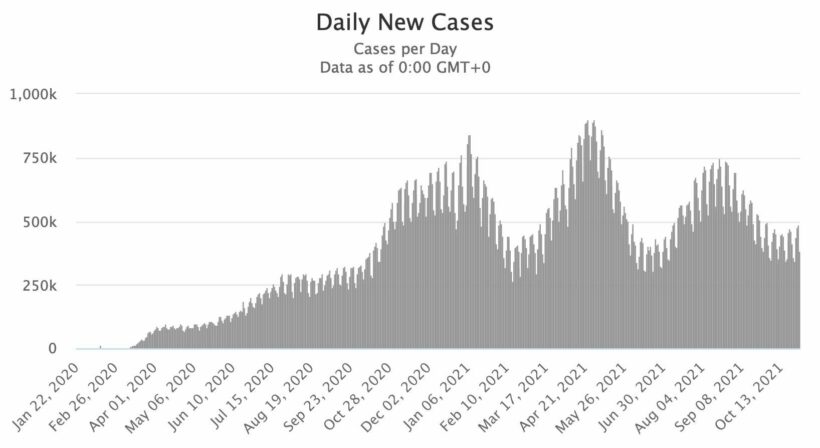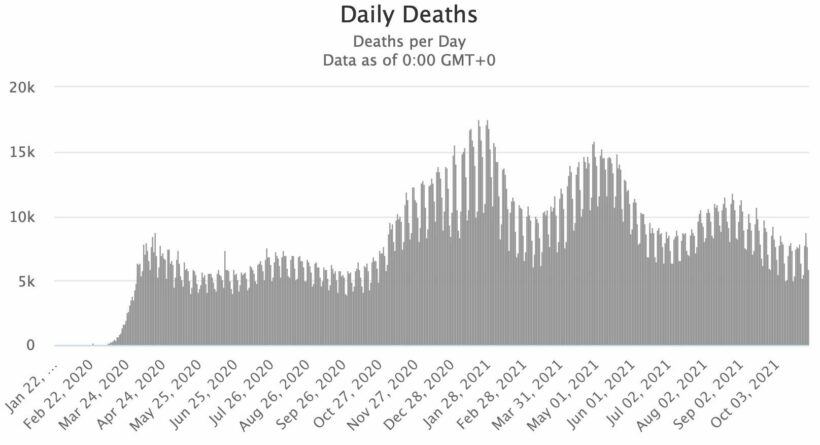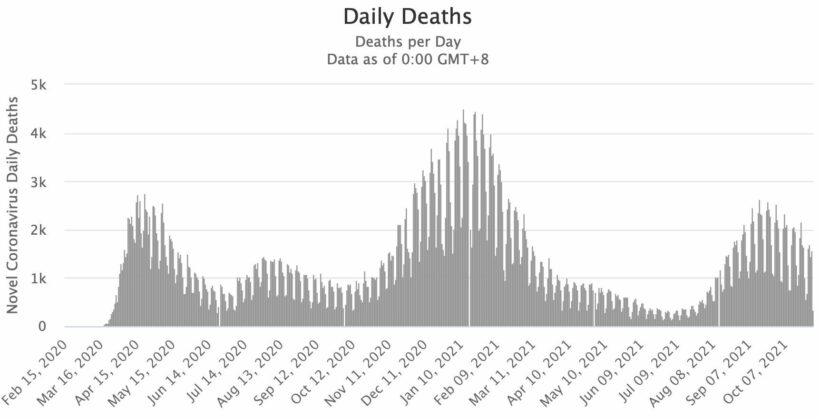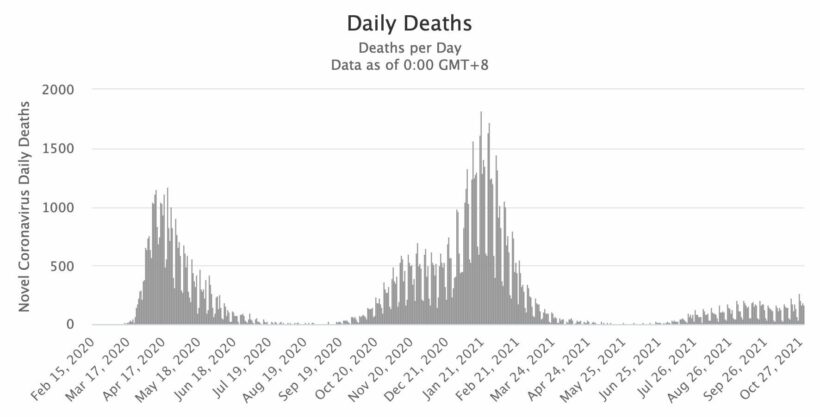5 million deaths – 22 months of Covid-19

Covid-19 has killed more than 5 million people across the globe, a grim milestone after nearly 20 months of lockdowns, information overload, misinformation and misery. The US has contributed the largest single body count from the coronavirus – 4% of the world’s population but 15% of the total deaths. Covid-19 is now a leading cause of death in the US, along with heart disease and stroke.
But even the most dovish of health officials believe that these numbers are just the tip of a deeper iceberg.
Amber D’Souza, professor of epidemiology at the Johns Hopkins School of Public Health, in Maryland, US, says that it’s quite possible that the true number of deaths from Covid-19 is double what has been officially published.
She says that testing protocols and diagnosis is not clear cut and that US’s catastrophic statistics may simply be a result of their more rigorous procedures. She also speculates that many millions of deaths in the past nearly 2 years could have been as a result of Covid, or exacerbated by Covid-19, but were listed as something else.
“No country has been able to escape it.”
Then there’s the almost incalculable collateral damage – sick people who have had to put off treatment and moved to the back of the queue. Others just avoided hospitals from fear of catching the virus. For example, the World Health Organisation reports that tuberculosis fatalities are up for the first time after dropping over the past decade. Cases in 2020 were around 1.5 million, about the same as numbers 5-10 years ago.
The Lancet medical journal estimated, in a July report, that “…862,365 children in 21 countries had been orphaned or lost a custodial grandparent due to Covid-19. South Africa, Peru. And the US has seen the highest numbers of newly orphaned children.”
The impact on health systems around the world has been immense, not only the obvious challenge on ICU beds, but the overwhelming and over-working of medical staff. The full impact of these secondary paradigms may never be fully understood.
The graph (from worldometers.info) tells its own story of the journey since January 2020 – three visible waves of infection with a fourth just starting – an indication that these pandemics historically follow quite similar patterns and that we should heed the warning that Covid-19 is not over yet.

GRAPH: Worldometers.info. Global daily infection data

GRAPH: Worldometers.info. Global daily death data
The world’s death statistics show that the Americas and Europe were particularly affected by the coronavirus pandemic. South America’s Peru has the death rate in the world with 615 deaths per 100,000 people. Then Europe’s Bosnia and Herzegovina, North Macedonia, Montenegro, Bulgaria, and Hungary are close behind, each with more than 300 deaths per 100,000 people. Some health experts speculate that both the US and European countries, for example, may have higher numbers of older people with underlying health conditions who were otherwise kept alive by robust health systems or quality hospitals.
The US leads the way in sheer deaths, 766,000+, followed by Brazil with 608,000+, and India with 458,000+ (as of October 31, 2021). Mexico, the UK, Italy, and Colombia have also had inordinately high death counts from the coronavirus.
Looking into the 20 month rear-view mirror, most of us would have not predicted this situation. That many sub-Saharan nations and parts of Asia have been relatively less affected, has also surprised pundits and health experts alike. The WHO believes that some of these region’s younger populations may be part of the reason for the lower death rates.
Some of the most recent surges, in infections and deaths, are linked to governments who have crumpled to political necessity and been forced to open up, despite the warnings from health officials. In the UK and the US, for example, the number of new infections have soared in the past 3 months, after political leaders have decided to relax restrictions and get people back to work. The cost of ongoing lockdowns to these governments, with generous stimulus and stay-at-home packages, and the economic machinery hobbled, has forced politicians to take the difficult decision to ‘live with the coronavirus’.

GRAPHIC: US death rate (worlometers.info)

GRAPHIC: UK death rate (worlometers.info)
The coronavirus has thrown the world’s economy into historically uneven and unpredictable turmoil. Stock markets up, but economies in recession, trillions of dollars worth of cash virtually printed out of thin air and given away to keep economies bubbling along. People losing their jobs but invisible cryptocurrencies surging in perceived value. World supply chains are now bottled up with labour shortages and the inability of manufacturers and markets to predict the demands. Experts predict this could further stimulate inflation, another looming threat for the next fews years at least.
The cost of this farrago will echo for decades and completely rewrite the predictability of economic data. All that stimulus cash will need to be paid back too, an uncomfortable political truth faced by some of the world’s largest economies. The spectre of a serious US market crash, or at least a major correction, also looms large after nearly 2 years of artificial stimulus, now that the money tap is being turned off by the US Federal Bank. Problems in the over-leveraged Chinese property market, compounded by Covid, will also reverberate and spread far beyond local borders.
What’s next?
The next phase of Covid-19 around the world will see an increasingly vaccinated global population trying to get their lives back on track. It will also see more clusters emerging but better medicine and knowledge continuing to lower the death rate.
But the true impact of the various Covid vaccines is still to be evaluated. Many countries, even developed countries, are struggling to get their vaccination rates much above 50%. The vaccine-hesitant and ongoing misinformation about Covid vaccines (or vaccines generally), is a serious challenge to medical officials to somehow contain, or slow, the further spread of Covid-19. On the African continent the average vaccination rate is only around 8% at this time.
On a global level, health officials and governments are looking to share the vast array of data that’s been collected so that policy makers can get ahead of the next pandemic before it happens. To the chagrin to many of the world’s leading health authorities, much of the known science and steps to contain a coronavirus outbreak were either partly ignored, or in some cases, challenged by politicians with no medical training. The lessons of SARS and MERS (both coronaviruses), less than 2 decades distant, were well documented but unheeded. At least those two smaller pandemics gave labs around the world a head start in the development of coronavirus vaccines, making a swift development, testing and deployment of a Covid-19 vaccine possible
Some countries chose to tackle a highly transmissible coronavirus, that doesn’t understand borders, on their own. Borders were closed. Even worse, in some countries, various states and provinces also took their own local actions with little national collaboration. The lack of a global effort led to the regional outbreaks and made an early containment almost impossible, unlike both SARS and MERS.
But today it is incumbent on all of us to reflect on the loss of 5 million lives, and the ones who will follow, as Covid-19 continues to spread. Even with today’s official 247,137,000+ tally of total infections, it’s still only around 3% of the world’s population, leaving the Covid-19 virus with plenty of people to infect and time to further mutate.
If you thought that Covid-19 was going to be over before Christmas this year, stow your tray table and buckle up for more turbulence ahead.
Latest Thailand News
Follow The Thaiger on Google News:


























